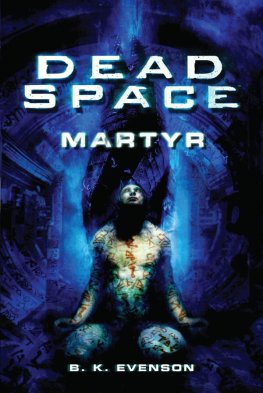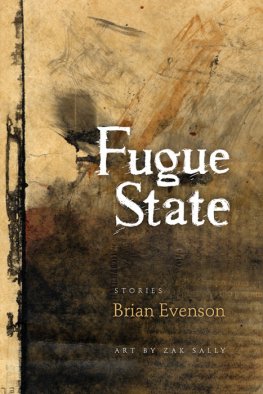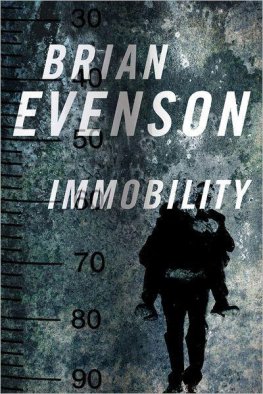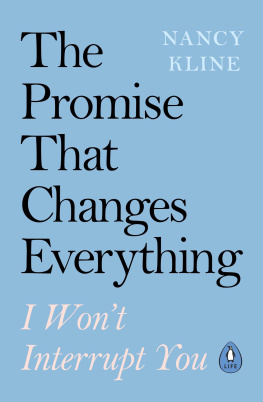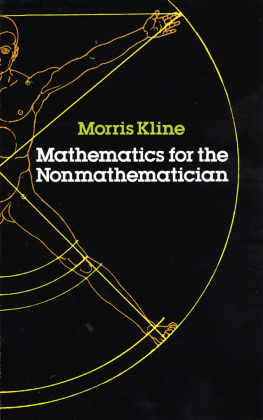Table of Contents
The Open Curtain
The Wavering Knife
Dark Property
Contagion
Father of Lies
Prophets and Brothers
The Din of Celestial Birds
Altmanns Tongue
LAST DAYS
Copyright Brian Evenson, 2008, 2009
The Brotherhood of Mutilation originally published in limited edition by Earthling Publications, 2003
Names, characters, places, and incidents are the product of the authors imagination and are used fictitiously. Any resemblance to events or persons, living or dead, is coincidental.
All rights reserved. No part of this publication may be reproduced or transmitted in any form or by any means, electronic or mechanical, including photocopy, recording, or any information storage and retrieval system, without permission in writing from the publisher.
Requests for permission should be emailed to underland@underlandpress.com.
Underland Press
www.underlandpress.com
Portland, Oregon
Cover image copyright by Karim Ghahwagi and Brian Evenson, 2007
Cover imaged used with permission from Karim Ghahwagi
Cover design by Heidi Whitcomb
Book design by Heidi Whitcomb
ISBN 978-0-9802260-0-3
Printed in the United States of America
Distributed by PGW
First Underland Press Edition: February 2009
10 9 8 7 6 5 4 3 2 1
For Paul
INTRODUCTION
What Are You Doing, Where Are You Going, Who Are You?:
by Peter Straub
The first persons to mention the work of Brian Evenson to me were students in the Writing Division of the Columbia MFA program. Despite the handicap of never having taken or previously taught a course in creative writing, once a week during the month of October 2004, I conducted what Columbia called a Master Class. In our first class session, not long after I learned that the campus bookstore had not yet received the students copies of our text, I asked the fifteen people arrayed before me to name the writers they most admired, and boom, there it was, a whole new world. George Saunders, Jim Shepherd, Ken Kalfus, Gary Lutz, Brian Evenson, two or three others... Of the writers they mentioned, I knew the work of only Mary Caponegro, Lydia Davis, and Ben Marcus, the director of Columbias writing program. Over the next few days, I ordered a good number of books by these writers, among them Evensons Altmanns Tongue . Soon the books arrived and I read them, or at least started reading them, at least sampled them. Some of the stories in the books Amazon faithful delivered to my doorstep really worked, I thought, really made the case for their authors vision by maneuvering language and the old tools of character, situation, rhythm, and presentation into brilliant combinations and patterns. Some others seemed less successful, and a very few clearly had been written for an audience that did not include me. (Their resolute bad temper as prose narratives closed the door, but these same stories struck me as extremely interesting, even beautiful, if read as poetry. Apparently, a radical reinterpretation of basic genre markers had been put into play utterly without my noticing it. In the intervening four years, I came across examples of this process I found more congenial, chief among them being Rosalind Palermo Stephensons great story, Insect Dreams.)
Evenson and Altmanns Tongue , though, seemed to me to operate on another level altogether. In these stories, stoniness, obduracy, harshness, madness, and violence take wing and fly, released into the air by a completely original imagination. The early Evenson stories tend to stop you in your tracks with flat, declarative reports of monstrosity. Bodies litter the ground. Murders take place, again and again. A man chews his way out of his coffin. A man named Horst advises our unnamed first-person narrator to eat the tongue of Altmann, whom the narrator has killed, whereupon the narrator kills Horst, admires his handiwork, and (I think) turns into a crow. Former concentration camp barbers hang out together. Alfred Jarry and Ernst Jnger pop in and do things that might as well be called inscrutable. In a great story called Two Brothers, a dying religious fanatic attempts to amputate his own gangrenous leg, but is murdered by one of his two sons, who cuts his eyes out of his head. Despite all the violence, which is somehow muffled by Evensons spectacularly matter-of-fact delivery, the feel of the comic is never distant from the enterprise. It is not entirely clear where the comedy lies, unless it is in the extravagance of the grotesquerie. Very little else can be said to be extravagant.
In fact, an incredible amount is left out of these stories rather sketchy narrativeslandscapes, contexts in general, back stories, and history in general. The stories take place in a barren world that offers very little of the unspoken consolation provided by fictions in which the reader sees the characters park their (brand name and dashboard description supplied) cars, walk up their paths past the pansies and daffodils, open the fridge and take out a (brand name supplied) beer, then walk past a coffee table and a corduroy sofa to flop down onto a Barcalounger and point the remote at the TV. None of that ever happens in Evensons fiction, unless the fridge contains a severed head and the corduroy is sticky with blood. The landscape inhabited by these Therons and Aurels and displaced writers is as stripped of particulars as the empty universe in which lovelorn Ignatz the mouse aimed bricks at the head of Krazy Kat. We might as well be in a desert. Also absent are the different, more profound consolations given by traditional narrative methods that establish tacit ground rules and expectations. Evenson was never at all interested in writing fiction that provided its own safety net. Without ever quite recognizing this habit, we enter fiction looking for the proscenium and the parted curtain, and when these comforting signs have been utterly erased, we readers have to deal with what turns out to be a productive anxiety. What does it say, to have violent acts depicted in such a thorough isolation, with such an absence of emotional affect? I dont mean say in some vaguely philosophical sense; I mean: what does it say to the reader ? One has the sense of a requirement without much specificity as to the required. This in itself evokes a powerful requirement, that of suspending judgment, of maintaining openness to whatever thoughts are evoked in the reading process.
Before we move on to the book at hand, one other point should be made about Evensons early, very striking fiction, namely that it clearly is the work of a writer just coming into his stride. Despite a pervasive nihilistic despair, the atmosphere and flavor of youth penetrate everything. This writer is willing to try almost anything that occurs to him, as long as it falls more or less within the circle of his aesthetics. Going wild makes him feel good, and he believes that when they read the results other people will feel good, too. Experiments with compression and duration tempt him. There are passages in these stories that, no matter how seriously their author took them, how much he understood to be at stake at even the simplest word-to-word level, undoubtedly made him laugh out loud with pleasure.
Throughout stories published over the six or seven years that followed Altmanns Tongue , as well as in the more mature and developed work Evenson has been producing since Dark Property of 2002, he has been demonstrating, illustrating, and justifying a consistent faith in the operations of the kinds of extremity present in his work from the beginning. The Open Curtain , published in 2006, uses a characters psychic disorder to push the novel into actual red-eyed, hell-for-leather narrative extremity, the only occasion I have ever seen in which a novel stops in its track and hunkers down to question its most elemental components. Its beautiful. Its stunning. It takes your breath away. The moment I read it, I knew that I had to steal it, and so I did, in the novel now sprawled out on my workbench/operating table, its little heart struggling to beat while its guts squirm beneath the editorial screwdrivers.


